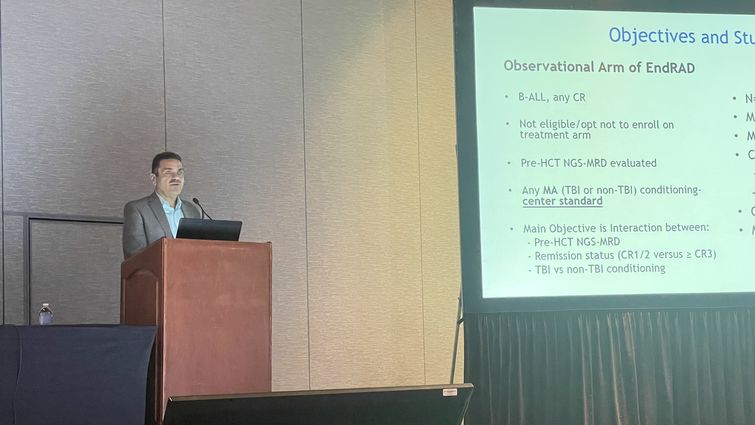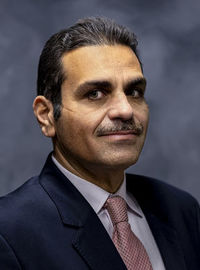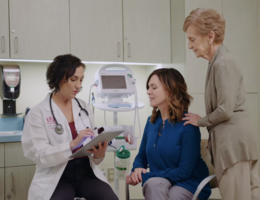

Hisham Abdel-Azim, MD, MS, chief of the division of transplant and cellular therapy at LLU Cancer Center presents study findings at the Transplantation & Cellular Therapy Meetings of ASTCT and CIBMTR.
Researchers say radiation may not be necessary for treating pediatric patients with B-cell acute lymphoblastic leukemia (B-ALL) undergoing stem cell transplantation, a change that would alter current protocol.
Investigators of an ongoing study found that patients without minimal residual disease (MRD) before their hematopoietic cell transplants experienced similar relapse-free survival rates — whether or not they underwent a pre-transplant radiation treatment known as total body irradiation.
An abstract from the observational arm of an ongoing study is using a new, highly sensitive test to detect hidden leukemia cells in the body of patients with B-ALL, the most common type of cancer in children. Patients who are negative on the test, called next-generation sequence minimal residual disease (NGS-MRD), before a transplant may be able to avoid exposure to total body irradiation, according to researchers. Past studies have indicated that NGS-MRD negative patients have a low risk of the cancer returning or relapsing.
“In light of current evidence, we believe that these patients can have good outcomes with no total body irradiation in their transplant preparatory treatment,” said Hisham Abdel-Azim, MD, MS, chief of the division of transplant and cellular therapy at Loma Linda University Cancer Center and lead investigator. “This study is a tool to refine risk stratification for patients who may not need the intense treatment of total body irradiation and therefore spare them from its long-term side effects.”
Abdel-Azim said total body irradiation is the most common preparatory treatment given before blood and marrow stem cell transplants for B-ALL patients. Total body irradiation has been the standard to eradicate leukemia, allow patients to accept donors’ blood and marrow stem cells, and may lead to less relapse and better survival post-transplant.
However, Abdel-Azim said total body irradiation has also been associated with more health problems and long-term side effects in transplant survivors — especially in pediatric B-ALL patients. Patients who have undergone the treatment can experience severe growth impairment, problems with hormone function, and developmental delays.
We hope that survivors will have less long-term health problems after treatment, compared to when total body irradiation is used.Dr. Hisham Abdel-Azim
Loma Linda University Health is currently among 36 U.S.-based blood and marrow stem cell transplant centers participating in the study.
Abdel-Azim recently presented findings during the Best Abstracts (Pediatrics) session at the 2023 Tandem Meetings by the Transplantation & Cellular Therapy Meetings of the American Society for Transplantation and Cellular Therapy (ASTCT) and the Center for International Blood and Marrow Transplant Research (CIBMTR). The abstract, “Excellent Relapse-Free and Overall Survival in Pre-HCT Next-Generation Sequencing (NGS-MRD) Negative B-ALL Patients with or without TBI-Based Conditioning: Outcome of the Observational Arm of the Pediatric Transplantation and Cellular Therapy Consortium (PTCTC) ONC1701 EndRAD Study,” was one of eight top-scorers selected by the 2023 Tandem Meetings’ Abstract Review Committees for oral presentation. It also published in the official journal of ASTCT, “Transplantation and Cellular Therapy,” in February.
Abdel-Azim calls the EndRAD a “practice-change study.” Traditionally, he said, patients with multiple relapses face poor outcomes post-transplant, and some even choose not to undergo further treatment. Yet this clinical trial’s observations show that more can be done in such cases, including sparing patients of total body irradiation in cases where it is not necessary.
The EndRAD study found that even in patients whose B-ALL had been treated and recurred, if they were NGS-MRD negative pre-transplant, their relapse-free survival was 70% at two years without total body irradiation, Abdel-Azim said. In contrast, these patients usually face a relapse-free survival as low as 20-25% or less at two years.
“Overall, these findings show us that patients who achieve NGS-MRD negativity have a reasonable chance of being completely cured,” Abdel-Azim said.
This clinical trial, coordinated through the Pediatric Transplant Cell Therapy Consortium (PTCTC), has two arms — the observation and treatment arms. For the treatment arm, all NGS-MRD negative B-ALL patients will receive chemotherapy treatment, rather than total body irradiation, before transplant.
“We hope that survivors will have less long-term health problems after treatment, compared to when total body irradiation is used,” Abdel-Azim said.
Abdel-Azim presented findings from the EndRAD study’s observational arm, which includes patients who do not meet the requirements for the study’s treatment arm. The observational arm involves testing patients with NGS-MRD and recording the course of treatment. Whether their pre-transplant preparatory regimen involved total body irradiation or non-total body irradiation was based on the treating center’s preference.
This study provides critical information that will guide future transplant treatments in B-ALL.Dr. Hisham Abdel-Azim
The EndRAD study’s observational and treatment arms will enable an ongoing, robust examination of the necessity of total body irradiation versus non-total body irradiation as pre-transplant preparatory regimens for NGS-MRD negative patients, Abdel-Azim said. He also said expanding enrollment will yield more insights into the factors affecting patients’ risk of relapse in the context of hematopoietic cell transplantation.
“This study provides critical information that will guide future transplant treatments in B-ALL,” Abdel-Azim said.
Learn more about pediatric cancer clinical trials at Loma Linda University Cancer Center online or call 1-800-782-2623.
Meet Our Providers
Hisham Abdel-Azim
Chief of the transplant and cellular therapy division
Specialties: Medical Hematology-Oncology
Learn more about this provider


